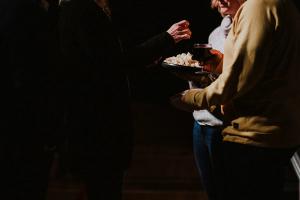“Consequently, he is able to save to the uttermost those who draw near to God through him, since he always lives to make intercession for them”— Hebrews 7:25
When a friend asks us to pray for them, what do we usually say? Of course! Sure thing! You got it! But as we move on to the day’s obligation, their request has a way of slipping through the cracks of our memory and disappearing. We didn’t try to forget. We didn’t plan to forget. But we didn’t try to remember either. The next time we see our friend, we may feel tempted to say we prayed for them, or we may see them coming and silently pray a quick one on the spot.
But when a friend asks us to pray for something we also struggle with—a wayward child, a chronic ailment, a dwindling income—we don’t have trouble remembering. Our own difficulties become the catalyst to pray for our friend the way we pray for ourselves. The next time we see her, instead of trying to avoid her, we immediately engage in sharing our common need.
We have become connected by the strong bond of shared weakness.
A Better Prayer Partner
Who is your most faithful prayer partner? A grandmother? A friend you walk with or call regularly? Your spouse or a best friend? Praying with someone else doubles our likelihood of regularly interceding for those in need. But what happens when that “someone else” isn’t available?
Hebrews 7:25 reminds us to lean on our most faithful prayer warrior, Jesus. Now that he has finished his work of dying for our sins and rising for our justification, Jesus has embarked on the new work of interceding for us. And his ascension perfectly positions him for this priestly service.
First, Scripture tells us that Jesus is invited to sit at the right hand of the Father, “The LORD says to my Lord: ‘Sit at my right hand, until I make all your enemies your footstool’” (Ps. 110:1). This is a position, not just of power, but of intimacy. He has his Father’s ear. When we are tempted and fail again, when we stumble and fall, Jesus prays. When we face danger or trouble from outside ourselves, Jesus intercedes. The smallest sigh, the slightest whisper of help goes straight to our Savior’s heart and to his Father’s ear.
Second, Jesus knows what it feels like to be weak and in need of prayer himself. He remembers the temptations of the devil. He recalls his agonizing struggle to submit his will to his Father’s. During that dark night before his arrest, Jesus did not refuse to obey, nor did he demand the Father remove the cup from him. Yes, he asked for it to be removed, but, above all, he pleaded for his Father’s will to be honored.
No one prayed for Jesus that night—not the eleven disciples who were sleeping, not Judas, who was even then in the act of betraying him. It was Jesus alone who agonized. Three times he asked, “My Father, if it be possible, let this cup pass from me,” and three times he submitted to his Father’s will, “nevertheless, not as I will, but as you will” (Matt. 26:39). Though his Father would have sent angel armies to deliver him, the Son knew he must fulfill the Scriptures (Matt. 26:53–54). Jesus was faithful in prayer throughout his ministry, even to his death, and he prays for us, his people, still—not from a cross, but from a throne.
What Stephen Saw
How do we know for certain that Jesus is praying for us in heaven? An incident from the book of Acts dramatizes this truth. Stephen served as a deacon in the early church. He was called “a man full of faith and of the Holy Spirit” (Acts 6:5) and was tasked with making sure the widows got their fair share of food each day—a vital ministry but certainly not glamorous. In addition, Stephen had been empowered by the Spirit to perform signs and wonders, as well as to skillfully proclaim the message of a risen, ascended Messiah.
His public preaching soon made Stephen a target, bringing forward a crowd of false witnesses. Brought before the high priest to explain his assertion that God would destroy the temple and change the customs of Moses, Stephen indicted Israel for their unbelief. Their historic rejection of God’s messengers was now being consummated in their rejection of Jesus. Enraged by his message, they began to execute him immediately by stoning.
Who would save him? Where was Jesus in his moment of need? That’s when the story turns:“But he, full of the Holy Spirit, gazed into heaven and saw the glory of God, and Jesus standing at the right hand of God. And he said, ‘Behold, I see the heavens opened, and the Son of Man standing at the right hand of God” (Acts 7:55–56).
Why had Jesus risen from his throne? Why was he standing? Not so he could get a better view of the situation, but to pray. Jesus stood to intercede with priestly authority for his servant Stephen. In his moment of greatest need, Stephen saw it. And in our moments of need, we can too.
A Savior Who Doesn’t Quit
Through his intercession Jesus is saving us “to the uttermost.” Our verse at the top of this post boasts about his ability to finish what he started. Our son trained for ten months to compete in an Iron Man Triathlon. The race involved a two- and half-mile swim, a 100-mile bike ride, and a 26.2-mile run. It was agony, taking him almost twelve hours to complete the course. But he didn’t quit. And when he crossed the finish line, he raised his arms in victory.
Jesus’s race involved temptation, opposition, betrayal, suffering, and the most painful and shameful death. But he kept his eye on the goal. It was “for the joy set before him” that he endured it all, crossing the finish line at last for the prize. And what was that prize? Us. His church. His bride. We are “the joy set before him” that the author of Hebrews talks about. Isaiah explains it this way,
Out of the anguish of his soul he shall see and be satisfied; By his knowledge shall the righteous one, my servant, Make many to be accounted righteous, And he shall bear their iniquities.— Isaiah 53:11
Friends, we are the joy set before him. We are among the many who are now accounted righteous. If Jesus has borne our sins far away, we can surely count on his prayers.





